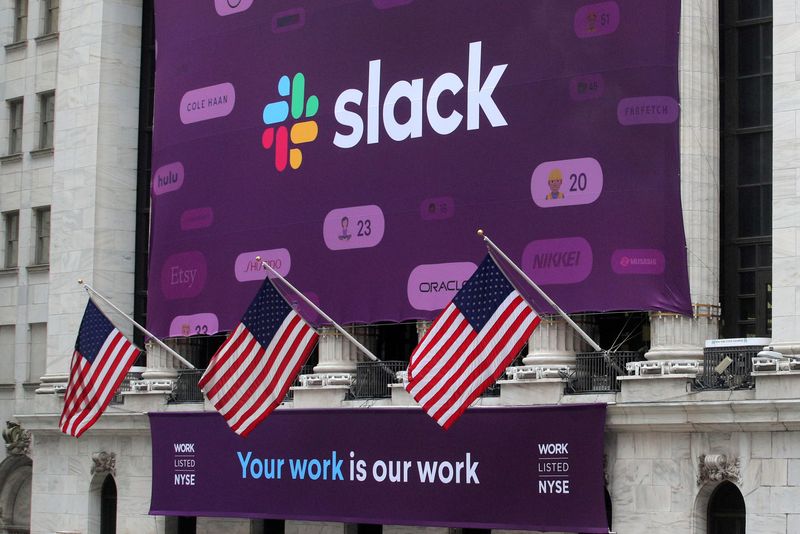By Andrew Chung
WASHINGTON (Reuters) - U.S. Supreme Court justices on Monday weighed a bid by Salesforce (NYSE:CRM) Inc's Slack Technologies (NYSE:WORK) to avoid a lawsuit over its 2019 direct listing in a case that could undermine the ability of shareholders to sue companies for alleged misstatements when they go public.
The justices heard arguments in an appeal by Slack, which makes workplace communications software, of a lower court ruling that let the proposed class action lawsuit filed by shareholder Fiyyaz Pirani for alleged violations of a federal investor protection law proceed. A direct listing is an alternative to a traditional initial public offering.
Questions asked by the justices indicated that even if they side with Slack on part of the case, they may send it back to lower courts to further consider the full scope of Pirani's claims.
Slack contends that Pirani's lawsuit alleging violations of Sections 11 and 12 of a federal law called the Securities Act of 1933 must be dismissed because he cannot prove that he bought registered shares that were specified in the company's allegedly misleading registration statement for the direct listing, rather than shares that were exempt from registration. The registration statement was filed with the U.S. Securities and Exchange Commission (SEC).
Salesforce, a major business software maker, purchased Slack for $27.7 billion in 2021.
The justices seemed open to Slack's view that Section 11 of the Securities Act, which lets plaintiffs sue for falsities in a registration statement if they bought "such security," refers to registered, not unregistered, shares.
"The statute says, 'such security.' I mean that's the big hurdle for you to get over," conservative Chief Justice John Roberts told Pirani's attorney Kevin Russell.
Liberal Justice Elena Kagan told Russell, "It does seem to me like you have hard row to hoe here."
But some justices also seemed hesitant to endorse Slack's view of claims under Section 12 - which focuses on untrue statements in a prospectus that accompanies the sale of a security - saying that there is little case law and the SEC itself has not weighed in on the issue.
"That strikes me as a big issue for these direct listings and something that I'm not sure we're fully equipped at this moment to chime in on," conservative Justice Brett Kavanaugh told Slack's lawyer, Thomas Hungar.
In a direct listing, an approach approved by the SEC in 2018, registered shares and the unregistered shares of early investors in a company are made available to the public at the same time. That differs from an IPO, under which newly registered shares are offered to the public while existing shareholders are typically barred from selling their unregistered shares for months.
Slack's direct listing released 118 million shares that were registered under its registration statement and 165 million pre-existing shares that were exempt from registration.
When Slack's stock price dropped, Pirani sued, alleging the company's registration statement and prospectus contained misstatements about service outages, the credits it promised to pay customers when service was disrupted, and the competition it faced from Teams, Microsoft (NASDAQ:MSFT)'s rival software.
The San Francisco-based 9th U.S. Circuit Court of Appeals in 2021 rejected Slack's bid to dismiss the case because Pirani cannot prove his shares were registered, saying the argument in the context of a direct listing would "create a loophole large enough to undermine the purpose of Section 11."
